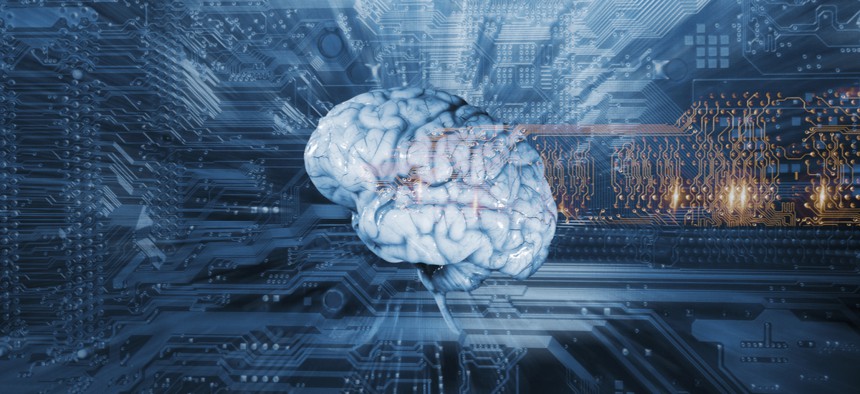Industry Teams Up To Teach Agencies AI

Christian Lagerek/Shutterstock.com
Two companies are teaming up in an effort to help agencies and their employees about AI.
Artificial intelligence is revolutionizing the way the private sector does business, and two companies want to help government use it to solve some of its biggest issues.
Booz Allen Hamilton is partnering with NVIDIA’s Deep Learning Institute to create a hands-on training program for federal employees looking to develop skills in artificial intelligence. Scheduled to launch in early 2018, the program will teach employees the basics of the emerging technology and help them design tools to address challenges in cybersecurity, defense and health care.
“We found broad interest from [federal agencies] to learn more about this topic and stay on the cutting edge,” said Graham Gilmer, a senior associate at Booz Allen Hamilton who working with NVIDIA to put the program together. “They want help from the tech sector … to accelerate their development and wield these [artificial intelligence] capabilities that are showing a lot of promise right now.”
Gilmer said the group is still working out an exact curriculum for the program, but they’re currently exploring standard as well as customized options for specific agencies. Trainers are also willing to host sessions on-site at different federal facilities.
The most vocal advocates for the training came from the Defense Department and intelligence community, said Gilmer, but he sees applications for artificial intelligence throughout all of government. At first the program will only be available to the company’s current federal clients, but he said they’re working to build a model for standalone training that will be open to any government agency.
“There’s a real opportunity here … to generate interest, build a little expertise, show what’s possible and possibly pilot efforts to bridge the gap” in artificial intelligence between the public and private sectors, Gilmer said.
Though artificial intelligence is largely new to government, the Air Force has already found a way the tech can make it more efficient on the battlefield. Project Maven uses artificial intelligence to rapidly turn drone surveillance footage into useful information, saving analysts countless hours of manually scrolling through and analyzing video for points of interest.
Gilmer pointed to Maven as a prime example of artificial intelligence solving a problem faced by most government agencies: a huge amount of information without enough resources to sift through it. Instead of throwing more people at a problem, artificial intelligence can take over the heavy lifting and free up employees to make thoughtful, more informed decisions.
In addition to developing the skills of current federal IT specialists, the training program may also help attract younger tech talent to government, particularly in the area of cybersecurity, said Peter Guerra, the chief data scientist at Booz Allen Hamilton.
The federal government faces a significant shortage of cybersecurity workers and has an especially tough time drawing younger employees away from more lucrative tech jobs in the private sector. Guerra believes that providing concrete training in the most innovative artificial intelligence techniques can incentivize in-demand cyber specialists to join the government.
“[The training] provides a lot of excitement for the younger generation coming in, and it actually attracts them too,” Guerra said. “If they know they’re going to get that training, and they know they’re going to be on the cutting edge, that’s going to be a huge draw.”



